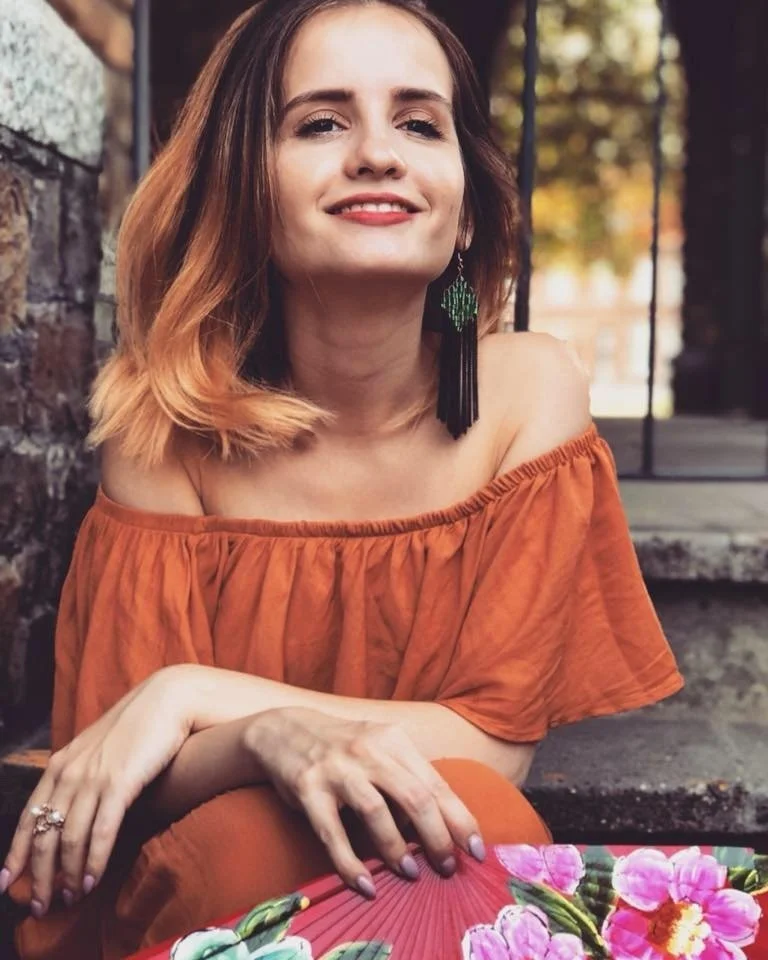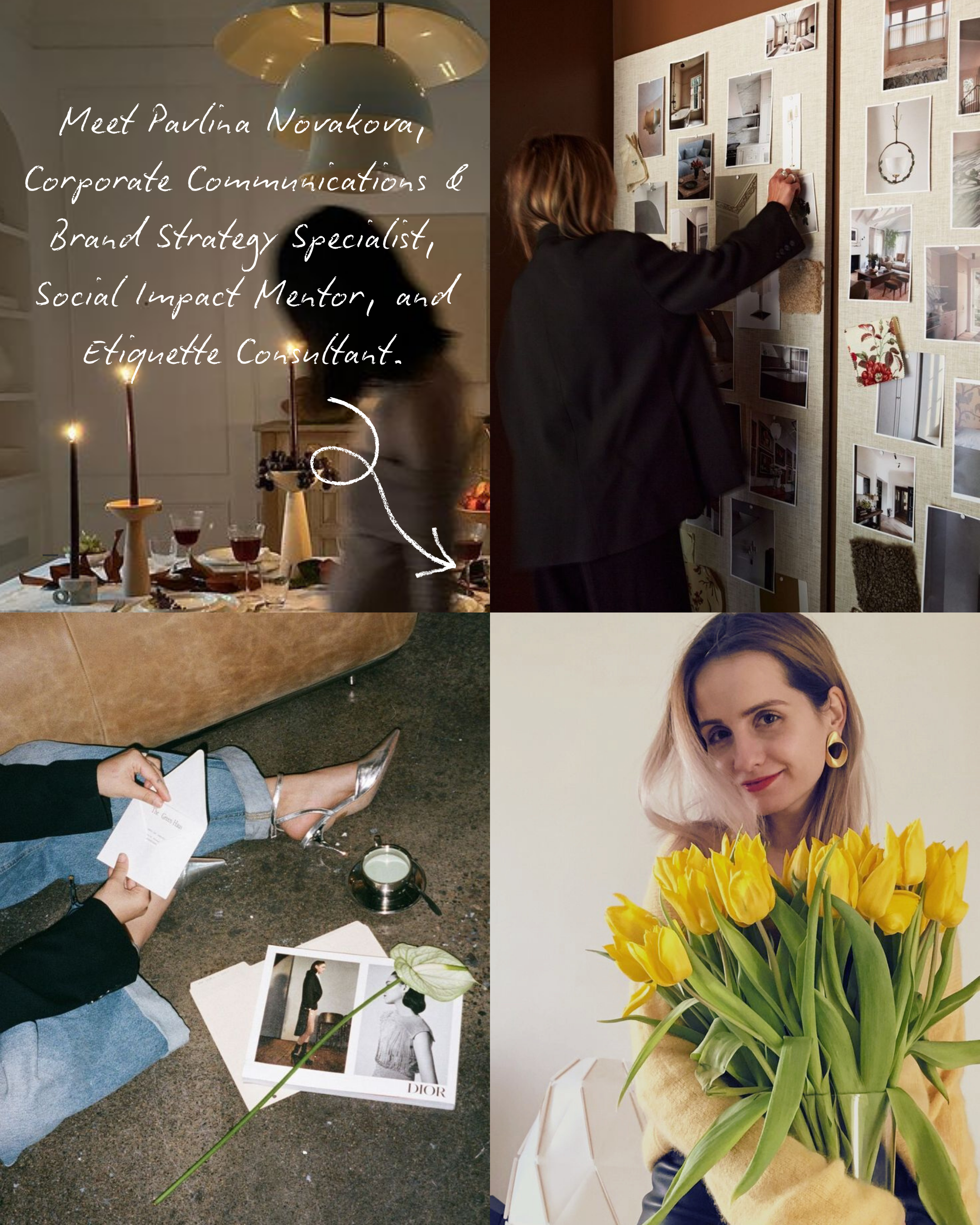Ask a Mentor Monday: Pavlina Novakova on Communication, Confidence, and Personal Growth
What does it mean to master the art of communication? Not just as a skill, but as a strategy for life and leadership.
This week, we continue our Ask a Mentor Monday series with Pavlina Novakova, a FÉ mentor whose career has woven through the worlds of fashion, automotive, and higher education. From corporate offices at Mercedes-Benz to classrooms at Erasmus University, her journey reflects a lifelong commitment to strategic storytelling, cultural fluency, and values-driven growth.
In Part One of our Q&A, Pavlina shared her take on early-career confidence, defining values, and finding the right mentor. Now, in Part Two, we go deeper into her story—and her areas of expertise—through a visual moodboard and deeper reflections on communication, diplomacy, and personal branding.
This one’s for you if you’re navigating professional transitions, learning to present yourself with intention, or simply figuring out how to connect your soft skills to your next step.
Meet Pavlina Novakova
“My path has never been linear, but communication has always been the common thread.”
Pavlina brings a dynamic mix of experience to the FÉ mentor network. She’s worked across e-commerce, fashion, and the automotive sector—eventually pivoting into education at the Rotterdam School of Management - Erasmus University. Her career reflects a deep commitment to cross-sector learning, and her mentorship style is centered on clarity, empathy, and intentional growth.
She thrives on variety, leading communications with both high-level strategy and human-centered storytelling. From building internal messaging systems to managing brand narratives at large-scale events, Pavlina helps individuals and organizations show up with presence and professionalism.
Outside the office, you’ll often find her hosting dinner conversations with women professionals—fostering community, one connection at a time.
Pavlina’s presence is where elegance meets intention. Her environments reflect poise, global thinking, and grounded strategy.
Your Questions, Answered
Each week, we invite the FÉ community to ask real questions—no fluff. Pavlina offered responses rooted in lived experience, strategic thinking, and human understanding.
How do you show experience when you don’t have “proof”?
“A great way to show you have experience and/or seniority is by demonstrating strong soft and people-related skills, along with the ability to see the bigger picture.
By soft/people-related skills, I mean things like relationship building, conflict resolution, working with people different from you, and cultural awareness. These all signal that you’ve spent time navigating real-world environments and know how to build meaningful connections to get things done.
Seeing the bigger picture means understanding the strategic importance of your work, approaching your role with intention, and being able to plan for specific outcomes.
Technical skills can be taught—but connecting people and aligning teams? That’s what sets experienced professionals apart.”
Takeaway: Soft skills signal leadership. Show your ability to connect and think beyond the task at hand.
How do you define your values?
“I define my values as the principles that guide how I show up—both personally and professionally.
What helps is asking yourself:
• What do I stand for, even when it’s inconvenient?
• What do I admire in others?
• What behaviors feel non-negotiable for me?”
Reflection Prompt: Revisit your last career decision. Which values guided that choice?
What’s the best way to build confidence early in your career?
“Try to gain experience doing different things and get comfortable being a beginner. You don’t have to be perfect.
This helps you develop a learner’s mindset, which is key to long-term growth and confidence.
Another tip: ask trusted people around you for ‘TIPS & TOPS’.
• TIPS = things you can improve
• TOPS = strengths you already show
This feedback gives you real insights into how others see you—and builds your confidence through truth, not fluff.”
Action Step: Ask three trusted people in your circle for your current ‘TIPS & TOPS’ Journal on what surprised you.
How do you know when a mentor is right for you?
“You’ll know a mentor is right for you when you feel aligned on values, even if your backgrounds are different.
The right mentor feels like a safe space: you can ask questions, be vulnerable, and truly be yourself. A good mentor helps you recognize your strengths while supporting you through challenges.”
Reminder: Mentorship is more about resonance than resemblance.
What’s the biggest myth you’ve heard about mentorship?
“The first one: that mentorship is one-sided. It’s not. It’s a two-way learning exchange where both mentor and mentee grow.
The second: that mentorship is only useful early in your career. That’s false—mentorship has value at every stage. Whether you’re just starting out or already in leadership, the right mentor can shift your perspective and growth trajectory.”
Reframe: Mentorship isn’t just advice, it’s a relationship that evolves.
Are there any shared or fixed values within mentorship?
“Yes! Three stand out to me:
Trust: Mentorship needs to be a safe space. The mentee must also trust the process and believe their mentor has their best interest at heart.
Empathy: You can’t truly support someone without recognizing that everyone’s journey is unique.
Openness: Both sides need to be willing to listen, reflect, and sometimes even challenge each other constructively.”
Guiding Principle: Growth requires vulnerability and vulnerability requires trust.
Pavlina’s Mentorship Areas
Want to work 1:1 with Pavlina? These are the key areas she supports mentees with:
Strategic Communications
Craft and execute messaging strategies across internal teams, leadership, and external audiences.
Personal Branding & Soft Skills
Develop a confident, professional presence. Learn how to position yourself with authenticity—online and in real time.
Etiquette, Protocol & Diplomacy
From cross-cultural interactions to high-level engagements, Pavlina teaches the interpersonal skills that shape lasting impressions.
“Etiquette is about intention. When we understand cultural context, we connect more honestly—and lead more effectively.”
Final Thoughts
Pavlina’s story is a reminder that growth isn’t always loud or linear. Sometimes it’s in the quiet confidence of knowing your values. Sometimes it’s in the soft skill you once overlooked. And sometimes, it’s in the presence of a mentor who reflects back to you what you couldn’t yet see.
Mentorship isn’t a quick fix—it’s a relationship. One that evolves as you do.
Ready to Go Deeper?
Book a 1:1 session with Pavlina or explore other mentors via the FÉ platform. Let mentorship meet you where you are!





